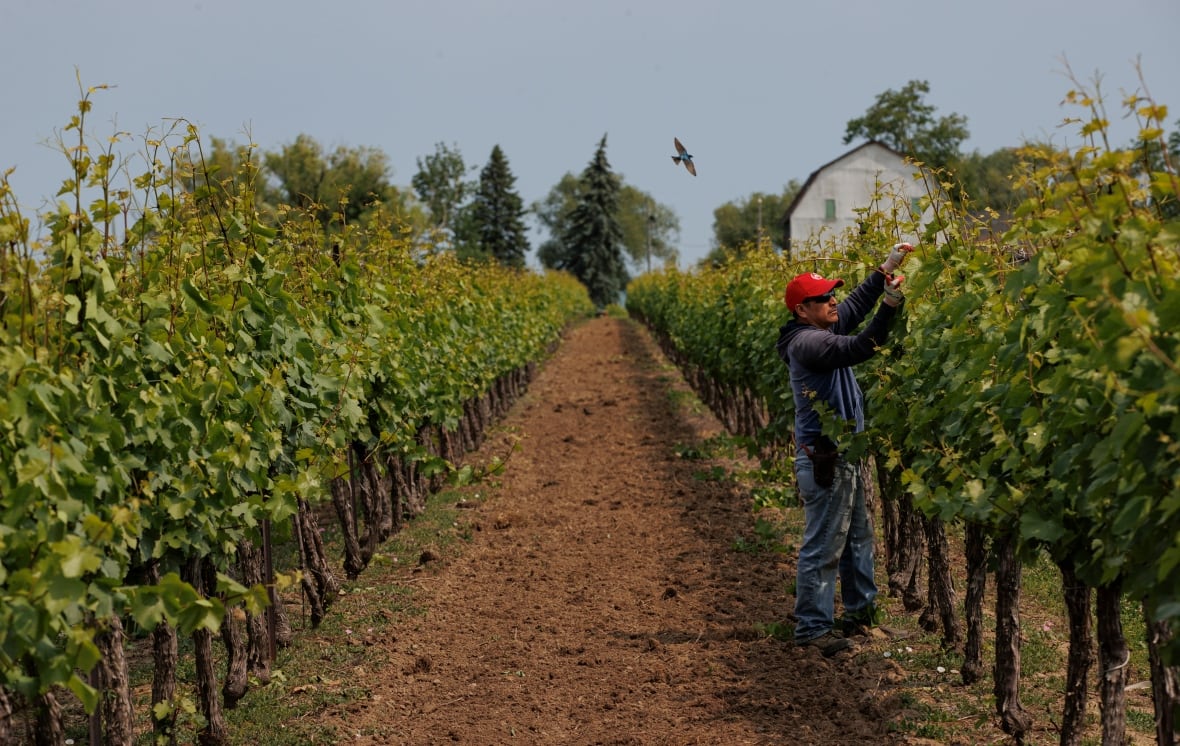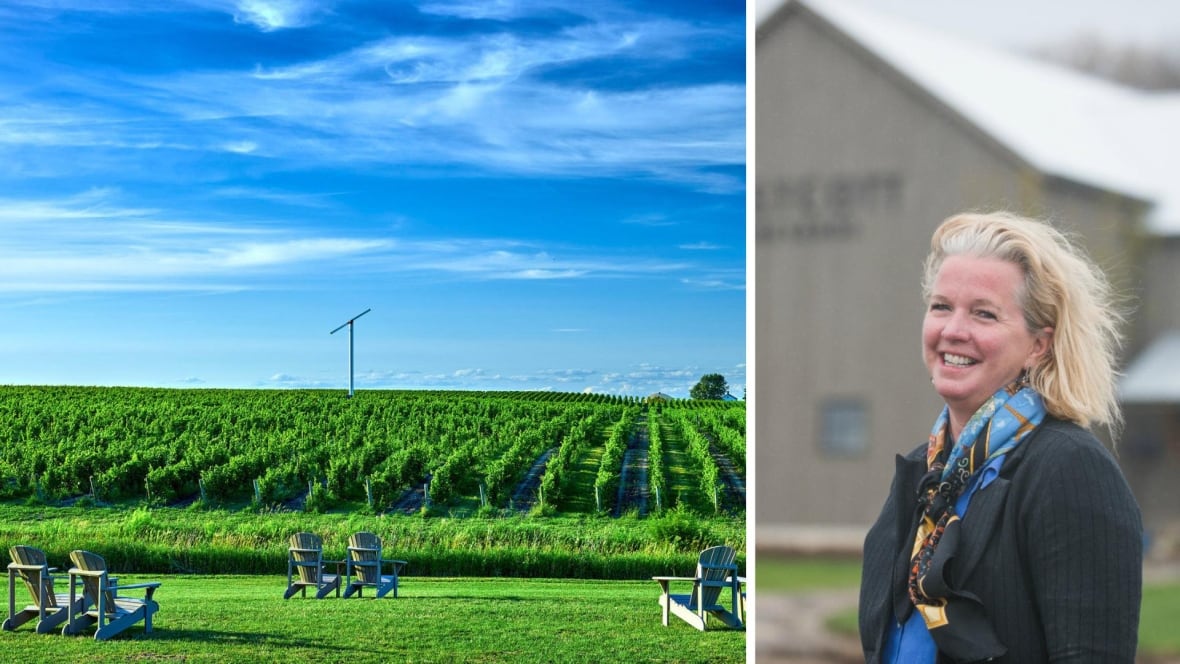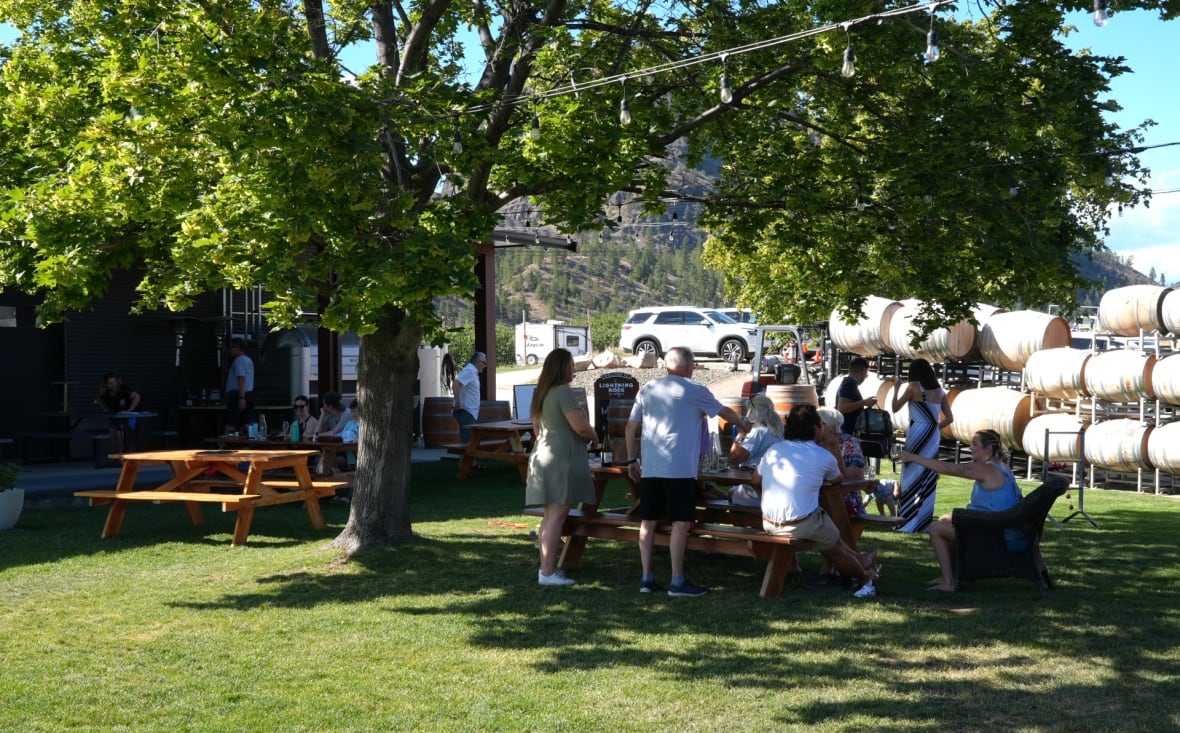How the U.S. trade war uncorked a surprising boom for wineries across Canada

Countless industries in Canada were stung when the trade war with the United States began earlier this year after U.S. President Donald Trump took office, but new life has been poured into one particular business.
Thanks in large part to the patriotic "Buy Canadian" movement, which has changed consumer habits and reshaped parts of the retail landscape, winemakers across the country say they're enjoying a rare and fruitful moment.
Several provinces — including Ontario, British Columbia, Quebec and Alberta — pulled U.S. alcohol products off their store shelves after the Trump administration slapped 25 per cent tariffs on almost all Canadian goods in February.
The impact of that response was felt almost immediately.
In Alberta, where the government announced in early March that Alberta Gaming, Liquor and Cannabis would stop accepting new shipments of U.S. liquor products, American wholesale wine sales fell by 55.5 per cent in the first quarter compared with the same period last year, according to AGLC. In Quebec, the Société des alcools du Québec reported a 58 per cent surge in sales of locally made wines between March 30 and Aug. 16.

"This has been a once-in-a-lifetime opportunity," Michelle Wasylyshen told Cost of Living.
Wasylyshen, president and CEO of Ontario Craft Wineries, which represents more than 100 producers, said wine sales across all retail channels — from grocery and convenience stores to restaurants — have jumped by 78 per cent.
She said the boost in sales has led wineries to hire more staff, invest in new machinery and expand their offerings, such as adding a restaurant component.
"[Consumers] are supporting jobs, tourism, farm families, transportation, manufacturing," Wasylyshen said.

At Westcott Vineyards in Ontario's Niagara Region, co‑owner Carolyn Hurst said the positive impact of the ban on U.S. alcohol products arrived fast. In just six months, its wine sales doubled compared with the previous year — and current order volumes suggest they'll double again, she said.
One significant way the company has become more visible is by securing spots on restaurant menus that weren't available before.
"We have a Chardonnay and a Pinot Noir that's similar [in] price point [with] a couple of California and Oregon products," Hurst said. "That's where we have found that there's been a huge uptake on our products."
Provincial retailers seized the moment, too.

Abhay Garg, vice-president of merchandising at the Liquor Control Board of Ontario, said while supporting local producers has always been part of its mandate, the removal of U.S. products has "definitely" created an unprecedented opportunity to highlight more of Ontario's smaller producers.
He said the LCBO was able to introduce products from 30 craft wineries under its Support Ontario banner when more shelf space for locally produced wines opened up.
"You'll see a little maple leaf next to the products that are produced in Ontario or in Canada," Garg said.
In B.C., the trend is similar. Jeff Guignard, president and CEO of Wine Growers British Columbia, said there's been an increase in wholesale wine volumes of six to 10 per cent over the past year.
While some consumers still lean toward international brands, he said, local tourism has picked up. Instead of heading south, more Canadians are visiting vineyards in their own backyard, including in the Okanagan region, Similkameen Valley and Vancouver Island.
"Once they're there, it's a bit of a choose your own adventure, and you never know what customers are going to fall in love with," Guignard said. "I've heard good stories from small, medium, large-sized wineries."
In June, Alberta and Saskatchewan announced they would lift their bans on American liquor imports.

Rob Taylor, director of policy and government relations at Wine Growers Canada, called the recent surge in Canadian wine sales a "positive trend." Still, he said, there's a long way to go.
Despite growing interest, Canadian offerings still hold a small share of the wine market — accounting for less than 20 per cent of sales in Ontario and under 30 per cent nationally, he said, adding that in Quebec, the country's largest wine-consuming province, Canadian wines make up just 0.5 per cent of the market.

"I think it's such a Canadian thing that we appreciate all the things from all around the world [and] we sometimes don't necessarily really give ourselves a shot," Taylor said.
The industry's long-term goal? To claim 51 per cent of the domestic market. But reaching that benchmark will require more than consumer goodwill, he said.
For decades, interprovincial trade barriers have hampered the wine industry's growth — but that may soon change.
Ten provinces and one territory have signed an agreement on direct-to-consumer sales of alcoholic beverages for personal consumption, agreeing to remove barriers preventing their alcohol from being sold in other provincial jurisdictions by May 2026.
"One of the great things that we're hoping ... is that you can go into downtown Toronto and be able to get an Okanagan red, or a Tidal Bay wine from Nova Scotia," Taylor said.
"Because believe it or not, in many cases a wine from another province is treated like an import."

For Sarah Nelson, who moved from the U.S. to Canada a few years ago, the ban on American booze forced her to make a personal shift. A longtime fan of California wines, she began exploring Canadian options and was surprised by what she found.
Through wine education events held by local shops, she discovered that "incredibly special, intelligent, thoughtful, environmentally conscious" producers were creating unique wines that reflect local terroir and culture.

"A lot of the producers in Canada are really focused on ... making Ontario‑specific wine or B.C.‑specific wine, as opposed to just trying to do European Cabernet but grown in Ontario," Nelson said.
"It actually expands your mind to what wines can be," she said. "I think it's exciting to have a moment where people are feeling pride in what they're growing and producing locally."
Nelson added, "I'm up for my Canadian citizenship this fall, and I'll be applying enthusiastically."
cbc.ca




